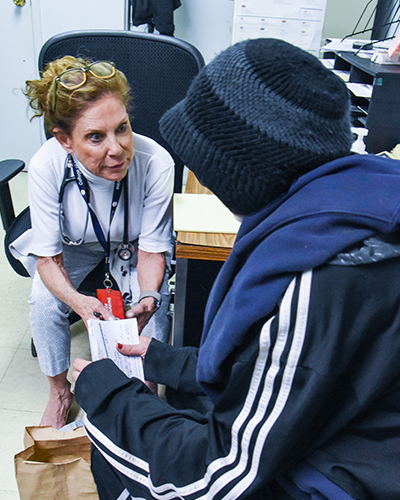New training program will prepare NPs to treat opioid use disorders
body

The UIC College of Nursing will offer a training program to prepare new nurse practitioner graduates to work with patients with opioid use disorders, thanks to a $1.8 million grant from the Health Resources and Services Administration.
The program is targeting a critical problem that the U.S. Department of Health and Human Services has declared as both an epidemic and a public health emergency. There were more than 90,000 drug overdose deaths in the U.S. from November 2019 to November 2020, according to provisional statistics from the CDC. That represents a 30% increase over the prior year.
“This is a huge problem, which has been exacerbated tenfold by the COVID-19 pandemic,” says UIC Nursing clinical assistant professor Karen Cotler, DNP, FNP-BC, FAANP, one of the program’s co-leaders. “There are so few providers caring for people with opioid use disorder.”
The five-year grant, which is co-led by UIC College of Pharmacy assistant professor Jennie Jarrett, means at least two trainees per year for the next five years will be able to complete the program. The trainees will be recently graduated nurse practitioners selected from a national pool.
“We want new providers to be out there working as harm-reduction providers [after they complete] the training program,” Cotler says. “We want them to be well-equipped, well-educated and fully comfortable treating people with an opioid addiction.”
Meeting patients where they’re at
The trainees will rotate through UI Health’s network of federally qualified health centers, Mile Square, which primarily serve the West and Southwest sides of Chicago. They will also train at a needle exchange site that also serves as a primary care clinic in the Austin neighborhood and in a mobile van, both run by the UIC Community Outreach Intervention Projects.
“This is important because we’re going to them,” Cotler says. “If the van goes to their corner – if it means they don’t have to walk six blocks to a clinic – it can mean the difference between getting treatment and not.”
In Chicago, there were 573 opioid related-overdose deaths from January to June 2020, a 50% increase compared to the same time period in 2019. The highest rates of opioid-related deaths occur in those same communities that are served by Mile Square, according to the Cook County Medical Examiner’s Office.
In addition to hands-on experience, the program will also incorporate a didactic curriculum that teaches prevention and treatment of substance use disorder, including: waiver training in Medication-Assisted Treatment, a Mile Square interprofessional workshop series on diagnosis and management of serious mental illness and substance abuse, and the Rush University Medical Center Opioid Use Disorder Treatment Fellowship ECHO Program.
Nurse practitioners are particularly well-positioned to work with communities with high levels of substance abuse disorder, and to prescribe medication-assisted treatment, including buprenorphine, methadone and naltrexone, according to Cotler. They are more likely to practice in rural communities, inner-city urban centers, at federally qualified health centers and other places with higher numbers of opioid use and misuse, Cotler says.
“This is harm reduction,” Cotler says. “It prevents them from overdosing. We don’t want to see the same numbers next year that we saw this year.”